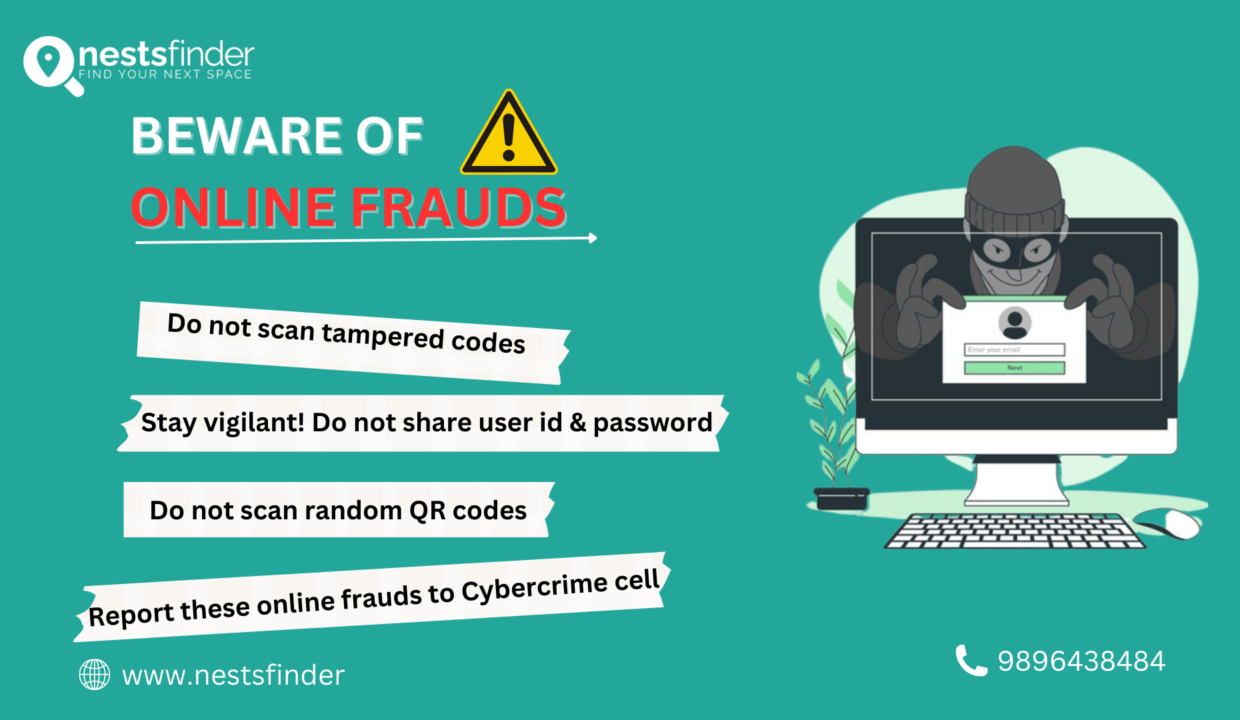Online Frauds : How to Protect Yourself
#realestate #salesproperty #urbanestate #onlinefraud
Online frauds are criminal activities carried out over the internet with the intention of stealing money, sensitive information, or personal identity. Online fraudsters use various tactics such as phishing, spoofing, hacking, and identity theft to deceive and manipulate their victims.
To protect yourself from online frauds, it is important to be cautious of suspicious emails or messages, use strong passwords and two-factor authentication, keep your software and operating systems updated, and avoid sharing personal information with unknown sources. Additionally, it’s recommended to use reputable antivirus software, encrypt sensitive data, and regularly monitor your financial accounts for any suspicious activity.
Types of online frauds
There are several types of online frauds, including:
- Phishing: this involves criminals sending fake emails or messages that appear to be from reputable sources such as banks or online shopping websites, and requesting the recipient to provide sensitive information such as credit card details or login credentials.
- Malware: criminals use various forms of malware such as viruses, spyware, or Trojans to gain unauthorised access to a computer system, steal data or damage the system.
- Identity theft: this occurs when criminals steal personal information such as social security numbers, bank account details or credit card numbers, and use it to commit financial crimes or other fraudulent activities.
- Business email compromise (BEC): this involves criminals targeting businesses or individuals and sending fake emails or messages that appear to be from a senior executive or a reputable supplier, requesting them to make payments or share confidential information.
- Online auction scams: this involves criminals creating fake online auction sites or online marketplaces and luring victims to purchase non-existent goods or services.
- Investment fraud: this involves criminals offering fake investment opportunities and convincing victims to invest money with the promise of high returns, but in reality, it’s a scam.
- Online dating scams: this involves criminals creating fake dating profiles and tricking victims into sending them money or sharing sensitive information.
These are just a few examples of the different types of online frauds. It’s important to stay vigilant and be aware of the various tactics used by fraudsters to protect yourself from falling victim to their scams
Four ways to guard against online frauds
Here are four ways to guard against online frauds :
- Do not scan tampered codes : Scanning tampered codes, also known as QR code fraud, can lead to various online scams and frauds. Fraudsters may tamper with a QR code to redirect you to a malicious website, trick you into downloading malware, or steal your personal information. They can also use the tampered QR code to make unauthorised transactions or payments from your account. Avoid scanning QR codes from unknown sources or those that appear to be tampered with or altered in any way.
- Stay vigilant and do not share user id and password: staying vigilant and not sharing your user ID and password is crucial in protecting yourself from online frauds. Your user ID and password are your first line of defence against unauthorised access to your accounts, and sharing them can give fraudsters easy access to your sensitive information. To protect yourself, it’s essential to use strong and unique passwords for all your online accounts, and avoid using the same password across multiple accounts. Additionally, enable two-factor authentication, which adds an extra layer of security to your accounts and helps prevent unauthorised access even if your password is compromised.
- Do not scan random Qr codes: Scanning random QR codes can lead to various online scams and frauds. Fraudsters may use fake QR codes to redirect you to a malicious website, trick you into downloading malware, or steal your personal information. They can also use the QR code to make unauthorised transactions or payments from your account. To protect yourself from QR code fraud, it’s essential to only scan codes that you trust and come from reputable sources. Avoid scanning QR codes from unknown sources or those that appear to be tampered with or altered in any way.
- Report these online frauds to the cybercrime cell : if you suspect that you have been a victim of an online fraud, it’s important to report it to the cybercrime cell or law enforcement agencies in your area. Reporting cybercrime can help prevent others from falling victim to the same scam and help authorities identify and apprehend the fraudsters responsible.
Some other ways
- Use Two-Factor Authentication: Two-factor authentication is an extra layer of security that requires you to provide an additional piece of information, such as a code sent to your phone, when logging into your account. This can help prevent fraudsters from accessing your accounts even if they have your login credentials.
- Be Wary of Suspicious Emails: Phishing emails often look legitimate and can trick you into giving away your personal information. To protect yourself, be wary of emails that ask you to provide sensitive information, click on links or download attachments. Always verify the source of the email and look for signs of a scam such as poor spelling and grammar, or suspicious sender addresses.
Conclusion
In conclusion, protecting yourself from online frauds requires being cautious and vigilant when using the internet. It’s essential to use strong and unique passwords, enable two-factor authentication, and avoid sharing your login credentials with anyone. You should also be careful when scanning QR codes, avoid scanning codes from unknown sources or those that appear to be tampered with, and only scan codes that you trust and come from reputable sources.




